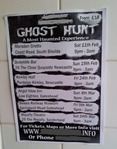 Better live a crossing-sweeper than die and be made to talk twaddle by a “medium” hired at a guinea a séance. – Thomas Huxley.
Better live a crossing-sweeper than die and be made to talk twaddle by a “medium” hired at a guinea a séance. – Thomas Huxley.
Sceptics are very often referred to by believers in the paranormal as “debunkers.” It is a term that is used in a derogatory way towards those, like me, who are not convinced that the paranormal is real. The fact is, though, there is a lot of bunk out there so it deserves to be shown for what it is.
The believers don’t like it, of course. When a cherished belief is shown to be false, then people have an automatic tendency to defend that belief even when they are standing in the rubble of the very belief that has just fallen down around their ears. And that attitude is commonplace when it comes to psi and its promoters. Even when some alleged psychic has failed to produce his or her paranormal powers under properly controlled conditions, or even been caught out in blatant fraud, the excuses flow fast and free in their defence.
There are many psychics who will not submit themselves to any kind of real test, of course, so it is open to speculation about how they actually achieve the apparent psychic phenomena they claim to produce.
Take psychic mediums, for instance. Whenever I have seen one of these people perform – whether live or on TV – I recognise cold reading techniques in action. I can describe and explain dozens of linguistic tricks that psychics employ to elicit information from their audience and then feed it back to them, giving the impression that they “knew things they could not possibly have known” unless they were really psychic. I can only say that if these psychics really have paranormal powers, then their expression of those powers is certainly indistinguishable from cold reading.
Unlike the believers in psi, who seem only too willing to believe what they see, I question things. If I watch a magician performing, then I can’t help but try to work out how those tricks are done. I have worked out how some of them are done, but the rest, I must confess, leave me baffled. And amazed. But the next time I find out how a particular trick is done I will probably think, “Oh, right. It’s obvious when you know how.”
That, however, is where the sceptics and the believers part company. A sceptic, almost by definition, is someone who wants to know what is going on out there in the world. Sceptics question things, rather than accepting what they experience as a matter of faith. In the same way I can speculate about how a magician produces a rabbit out of a hat, I can also speculate about how psychics of all stripes achieve the effects they produce. Perhaps a spoon bender does his act with genuine psychic energy; I can’t disprove it, but I can suggest ways that the same effect can be manifested with simple conjuring tricks. And given the fact that alleged psychics cannot produce their effects when they are not in control of the situation, it seems more likely that they do not have the abilities they claim (even if they genuinely believe they have those powers).
For most psychic claims, I can probably think of a plausible explanation that does not require psi to be behind it. Those explanations can range from a person’s innate ability to communicate with people (as in many not-really-psychic readings), to the outright fraud that has bedevilled much of psychic research in the past.
Then comes the big problem: the believers in the paranormal don’t like it when mundane solutions are proposed for the events they think are paranormal. Sceptics are accused of simply inventing “just-so” stories to “explain away” what, to the believers, are incontrovertible facts, namely what they think is the reality of the paranormal.
Given the fact that no one has actually proven the existence of any paranormal phenomenon, it is entirely reasonable to look for ordinary explanations for what are claimed to be extraordinary events. If there is a possible ordinary explanation that does not require the invention of mysterious energies for which there is no evidence, then the ordinary explanations are quite reasonable (Occam’s Razor – another post, another day).
Then again, who is it who is really pressing “just so” explanations on us? In fact, it must be the paranormal proponents themselves. Sceptics can offer possible explanations that are mundane in nature, but by no means fantastical. The believers, however, offer the following and more, none of which can be verified in the slightest:
-
“Psychic energy/vibrations” can be disrupted by the presence of a sceptic/unbeliever. (Yet no one has proven the existence of psychic energy, never mind showing us what it is that actually vibrates in these scenarios. It is nothing more than pure speculation.) I would call that a just so story. It is also bad thinking.
-
“These psychic abilities are elusive and cannot be called up at will.” (That’s a handy way to “explain” why psychics cannot do their performance under controlled conditions. But how come stage psychics never have that problem when they are in control of the situation?) It’s a claim, but without any verification. Just so. More bad thinking.
-
“A poltergeist is thought/believed to be a manifestation of negative or dark energy.” (The believers can think or believe that as long as they like, but without evidence to back it up, it is yet another just so story. Anyway, why don’t they demonstrate this mysterious energy?) Making things up to explain something that cannot be objectively demonstrated has the whiff of desperation. Bad thinking.
-
When a psychic is put on the spot and asked outright to demonstrate psychic phenomena, then it just “doesn’t work like that.” (But no one tells us how it does work anyway.) If that is supposed to be some kind of explanation, it is worse than useless – more of an excuse than even a just so story. Good enough for the believers, but still bad thinking.
-
Strange creatures (allegedly) are able to enter and exit this world from another dimension. Evidence for that? No, of course not (anyway, what would a creature that exists in more than three spatial dimensions look like?). It’s another just so story that explains precisely nothing.
My favourite example concerns Eusapia Palladino, a supposed psychic medium who was routinely caught out in fraud and fakery – even by the big names of the time. And no one – even among the believers – dispute it. They accepted that Palladino did cheat regularly, but they still accepted her as genuine because there were some manifestations that appeared to them to be truly psychic; in other words, they couldn’t work out how she cheated on those occasions. In any case, it was claimed that when the spirits refused to co-operate, Palladino made it up as she went along because she didn’t want her audience to be disappointed. That’s alright, then, according to the believers. Just ignore the fraud that was uncovered; believe the excuses, and assume that you can’t be fooled just because you can’t find out how the other tricks are performed. The bad thinking just continues.
And so it goes on. Claims for the existence of the paranormal are just that – claims. It is fair enough to look for plausible explanations for implausible claims, but possible normal explanations are not merely just so stories – at the very least, they are explanatory hypotheses that can be tested. Before the believers say that sceptics are using just so stories to discredit paranormal claims, I think the paranormalists themselves should examine their own just so stories, which are really nothing more than implausible speculation to explain implausible claims that none of them have ever demonstrated to be real in the first place.
When you get down to it, just so stories are the province of the true believer, not the sceptic. If you are a believer and want to make a claim that this or that paranormal phenomenon is true, then be prepared to provide the proof of your claim. I can offer plausible explanations that do not contravene the laws of physics. Sometimes I cannot even do that – in the same way that I cannot explain many magicians’ tricks. But until you can support your claims of psi with testable evidence, I regard your unsupported claims – and unprovable excuses for failure – as the very just so stories you accuse sceptics of.




